Donor : Forumciv
Project : Fisheries Conservation by Community Fisheries in Mekong and its tributaries in Stung Treng, Cambodia
Date : 2021
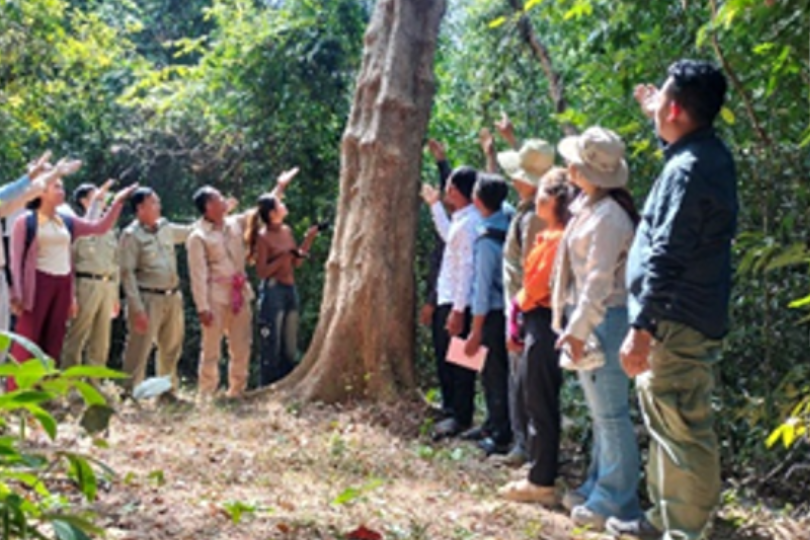
Donor : Forumciv
Project : Fisheries Conservation by Community Fisheries in Mekong and its tributaries in Stung Treng, Cambodia
Date : 2021
In the heart of Mondulkiri’s forests, Indigenous communities face mounting threats from deforestation, illegal logging, and climate change. In response, My Village Organization (MVi) launched an initiative to empower Indigenous Women Groups (IWGs) and Indigenous Youth Groups (IYGs), nurturing their role as environmental stewards.
Over 50 Indigenous women and youths in the Or Boun Leu Community Protected Area (CPA) received training in sustainable forest management, GPS tracking, and data collection. These efforts enabled 52 forest patrols, uncovering 33 illegal logging incidents and dismantling 64 wildlife traps. Beyond enforcement, the project built capacity, igniting youth leadership and integrating traditional knowledge with modern conservation strategies.
“I don’t just see trees—I see it as my future, my IP culture, and my home,” shared 24-year-old Sy Soktho, an IYG member and CPA Committee representative. Through hands-on forest patrols and school-based outreach, Soktho and her peers helped raise awareness on biodiversity, responsible land use, and climate change adaptation, linking generations through shared responsibility.
The Enhancing Indigenous Youth and Indigenous Women Participation in Community Protected Area Forest Monitoring and Climate Change Adaptation in Mondulkiri Project (EIPCC) promoted trust and collaboration between communities and local authorities. It ensured that Indigenous voices shaped conservation efforts, preserving both ecological integrity and cultural heritage.
Community members like Mr. Sat Sot, a senior CPA representative, expressed deep pride in the youth-led transformation: “Seeing our youth and women take the lead gives me great hope. Conservation is not just a responsibility—it’s a way of life.”
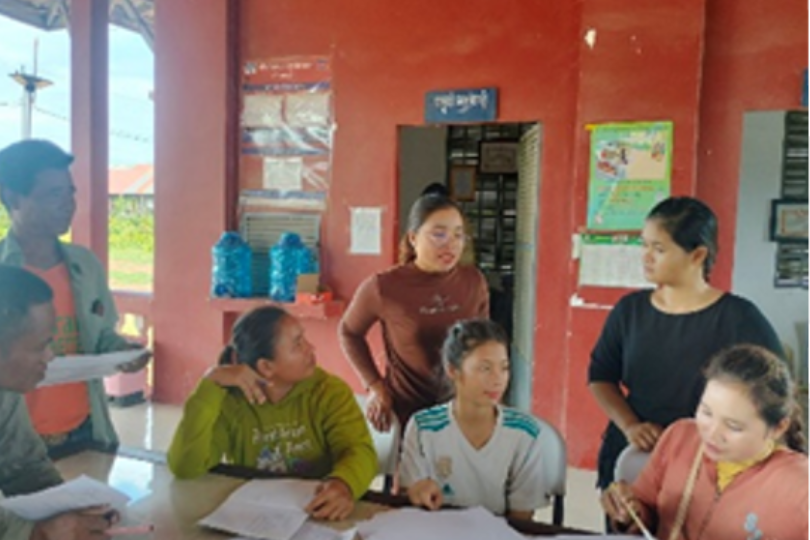
Historically sidelined from governance, Indigenous communities in Mondulkiri, Cambodia, are now reclaiming their seat at the policy table discussion. This transformative initiative was supported by My Village Organization (MVi). Through the Enhancing Indigenous Youth and Indigenous Women Participation in Community Protected Area Forest Monitoring and Climate Change Adaptation (EIPCC) project, over 50 Indigenous women and youth were trained in policy literacy, advocacy, and strategic dialogue with local authorities.
I vividly remember my first commune meeting—where my voice didn’t just echo, it mattered. This wasn’t symbolic inclusion; it led to real change. As a result of our active participation, 100% of targeted Commune Investment Plans (CIPs) now integrated Indigenous priorities like forest protection and climate resilience.
One powerful voice in this transformation is Ms. Khe Sreypin, a 27-year-old member of O’Nglav Community Protected Area (CPA) Committees, who declared, “When decisions about my land are made, I must be at the discussion table, not just watching from the sidelines.” Her leadership helped move CPA plans from community discussion to official policy.
This initiative didn’t just influence documents—it sparked a cultural shift. Dialogue between Indigenous communities and commune councils became more transparent and equitable. Women and youth are now decision-makers, not observers, and their perspectives inform every stage of development.
Mr. Man Ream, commune chief of Sray Huy, affirmed this evolution: “Today, CPA members, especially women, are actively engaged in CIP processes, ensuring our forests are protected for future generations.”
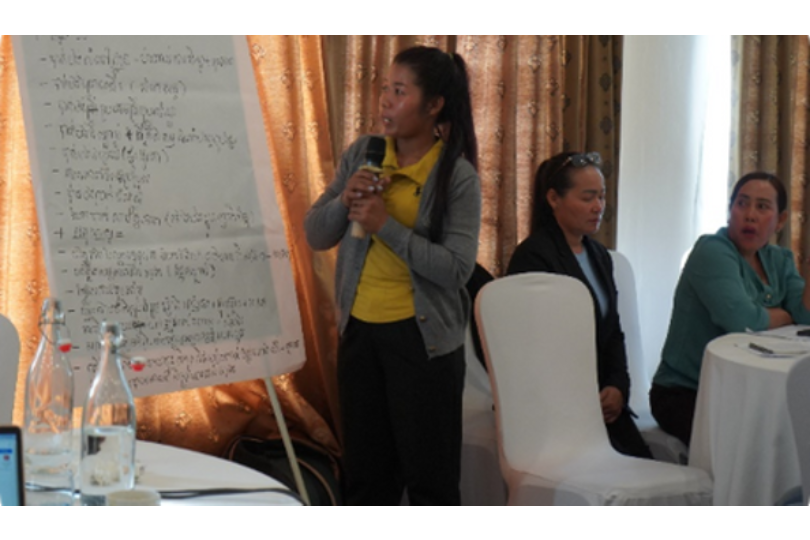
In Srea Sronuk village of Stung Treng province, Mrs. Don Chorvy stands as a powerful symbol of resilience and advocacy. Following the resettlement of her community due to the Srea Pok III hydropower dam, she emerged as a key voice for those grappling with the aftermath of large-scale development.
Resettlement brought profound disruption. Families faced inadequate housing, school closures, teacher shortages, and limited access to health services. The community also lost forested areas, vital wildlife habitats, and parts of their ancestral culture. Fishing became difficult due to sedimentation and degraded water quality, while changes in the river’s regime led to declines in fish species. These shifts fractured community unity and deepened economic insecurity.
Despite these hardships, Mrs. Chorvy transformed adversity into action. With support from My Village Organization (MVi) and other networks, she received capacity-building and technical training that enhanced her leadership skills. Her advocacy gained national visibility when, in December 2024, she participated in a national forum to share lived experiences of displaced women and families along the Sesan River.
Her testimony resonated. By clearly articulating the gendered impacts of resettlement, Mrs. Chorvy encouraged dialogue among stakeholders and authorities. As a result, several key concerns raised by the community—particularly relating to education, livelihoods, and cultural preservation—received renewed attention and commitments for redress.
Today, Mrs. Chorvy’s transformation from a displaced villager to an influential community leader exemplifies the power of grassroots leadership in shaping equitable development. Her journey demonstrates the importance of giving women space, support, and platforms to participate meaningfully in decision-making processes—especially in the context of development projects that fundamentally alter lives. Her voice continues to guide Srea Sronuk toward a more inclusive and resilient future.
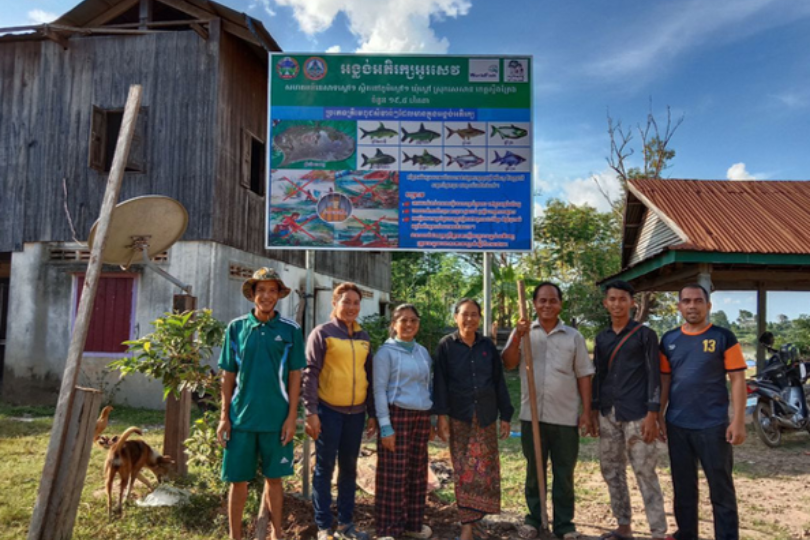
In Koh Snaeng village, nestled along the Mekong River, 26-year-old fisherwoman Mrs. Korn Samdorn once lived quietly, her daily life shaped by the river’s rhythms. Like many women in her community, she had never participated in public discussions or development activities—until the My Village Organization (MVi) introduced a project grounded in Feminist Participatory Action Research (FPAR).
Initially hesitant, Mrs. Samdorn was invited to attend an FPAR workshop where she discovered the value of her lived experiences. “I never imagined my thoughts as a woman fisher could shape decisions. But the facilitators made me feel heard,” she recalled.
That experience sparked transformation. Mrs. Samdorn became an active member of the community research team, documenting changes in fish populations, water levels, and ecological trends. Group discussions with women and youth leaders revealed shared challenges—declining fish stocks, polluted waterways, and limited access to clean water. Together, they identified root causes and co-created solutions.
Through the project, Mrs. Samdorn gained the confidence to speak up at community meetings and engage with local authorities on water resource governance. “Before, I stayed silent. Now, I know my voice matters,” she said. She began sharing research findings at sub-national workshops in Kratie and Stung Treng, amplifying the concerns of women fishers across the region.
Through the project, Mrs. Samdorn gained the confidence to speak up at community meetings and engage with local authorities on water resource governance. “Before, I stayed silent. Now, I know my voice matters,” she said. She began sharing research findings at sub-national workshops in Kratie and Stung Treng, amplifying the concerns of women fishers across the region.
Mrs. Samdorn’s evolution—from isolated voice to respected advocate—reflects the transformative power of inclusive approaches like FPAR. By centering the perspectives of women, youth, and Indigenous Peoples, the initiative has not only strengthened local water governance but also sparked personal empowerment.
Her story serves as a testament to what’s possible when marginalized voices are invited to lead. From monitoring river changes to influencing policies, Mrs. Samdorn now helps shape a future where every woman’s perspective can guide sustainable water management.
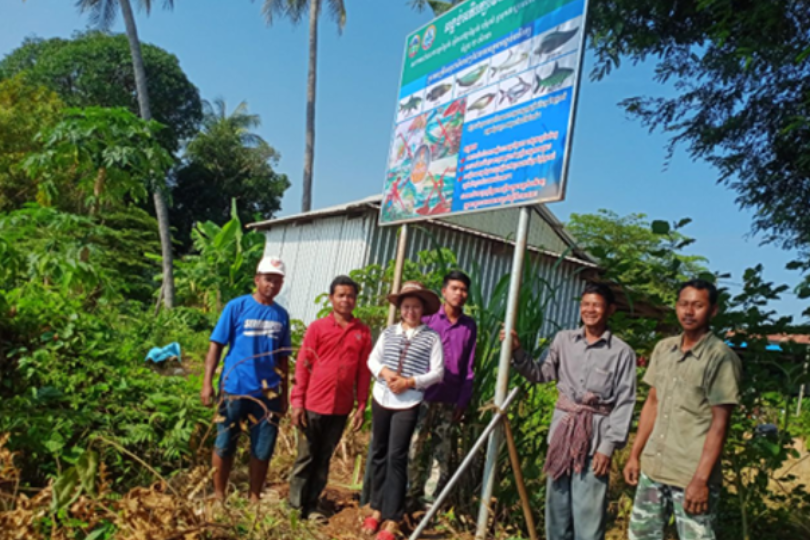
In O’Rey village of Thala Borivat District, Stung Treng Province, Mrs. Sen Sovan—once a quiet fisherwoman balancing household responsibilities—has become a prominent leader in community-based fisheries management.
Encouraged by her local Community Fisheries Committee, Mrs. Sovan stepped into a training role, sharing knowledge about integrating fish ecology into local fisheries management. But her path wasn’t easy. Like many women in rural Cambodia, she faced significant barriers—limited formal education, domestic expectations, lack of confidence, and gender-based discrimination.
Support from My Village Organization (MVi) and Oxfam proved transformative. Through capacity-building workshops, forums, and leadership training grounded in fish ecosystem management, Mrs. Sovan gained technical skills and the confidence to lead. She participated in planning signage for protected areas, conducted awareness-raising sessions on ecosystem-based fisheries, and helped coordinate the integration of ecological principles into the community’s fisheries project.
Her efforts extended beyond training. She facilitated community planning meetings to identify equipment needs for conservation, championed women’s participation in resource governance, and mentored younger women to take part in local decision-making processes.
“I urge all women to have courage,” she said. “Even if there’s no income, our voices deserve space in community work. Together, we must care for our fisheries—for sustainability and for our children.”
Today, Mrs. Sen Sovan’s story illustrates how women’s leadership, when nurtured through inclusive support, can reshape natural resource management. Her journey stands as a testament to the power of grassroots action, local wisdom, and gender equity in achieving sustainable development.
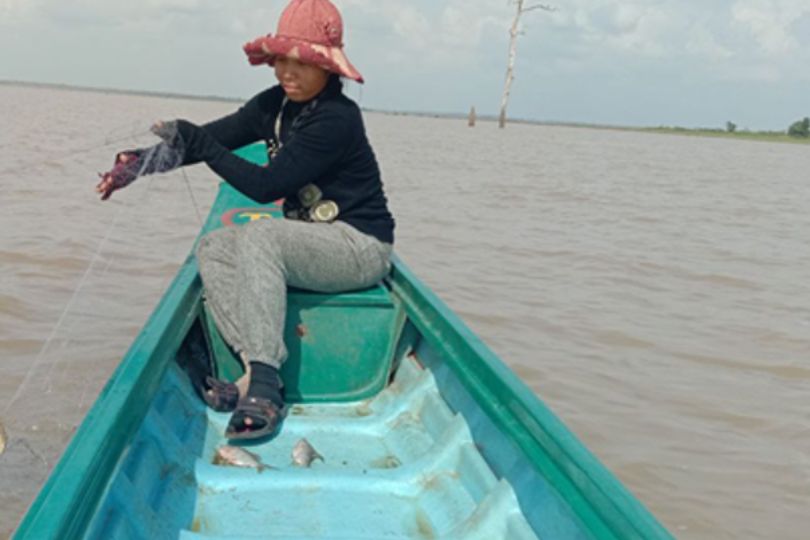
At just 23, Mrs. Dorn Chorvy from Srea Sronuk village, Stung Treng province, has emerged as a committed leader in sustainable fisheries. A mother of two, she balances daily fishing and farming to support her daughters’ education.
Life hasn’t been easy—Chorvy left school to care for her ill mother and faced numerous challenges, including limited confidence and recognition as a young woman in leadership.
In 2020, during a time when COVID-19 restrictions, illegal fishing, and land disputes disrupted the community, Chorvy was selected as a women’s leader. Yet early on, she often felt her voice went unheard. “I used to lose confidence,” she recalled, “because even when I was invited to meetings, my ideas were not accepted.”
Support from My Village Organization (MVi) and Oxfam marked a turning point. With technical guidance and funding, Chorvy received training, coaching, and networking opportunities that strengthened both her confidence and technical capacity. One key area was fish catch monitoring—a vital tool in sustainable fisheries management.
Initially, Chorvy lacked confidence to facilitate data collection with local fishers and worked alone. But after months of training and hands-on experience, she gained expertise and even conducted echo-trainings for other community members. Her field efforts—tracking species, recording catch volumes, and engaging with stakeholders—demonstrated how empowered women leaders can contribute to ecological knowledge and resource governance.
“I’m proud of my role,” she said. “I’m committed to doing my best, and I sincerely thank MVi, Oxfam, and the local authorities for their trust and support.”
Chorvy’s journey is a testament to the transformative impact of inclusive leadership and capacity building. Her work not only advances sustainable fishing practices but also inspires other women to lead with courage and purpose.

The perception that eating bushmeat can cure diseases or supplement health is not right. However, continuing to eat bushmeat can cause serious risks (even death) for your health. Participate in talking about the negative impacts of eating and trading bushmeat together for the safety, health of you and your family, help protect and preserve our environment and natural resources.
#Talk2ProtectOurWildlife #SayNoBushmeat #NegativeImpactOfBushmeatOnHumanHealth #TogetherForCambodiaWildlife #TimeToStandUpForTheWildlife #TogetherWeSaveOurWildlife #WildlifeIsnotMadicine
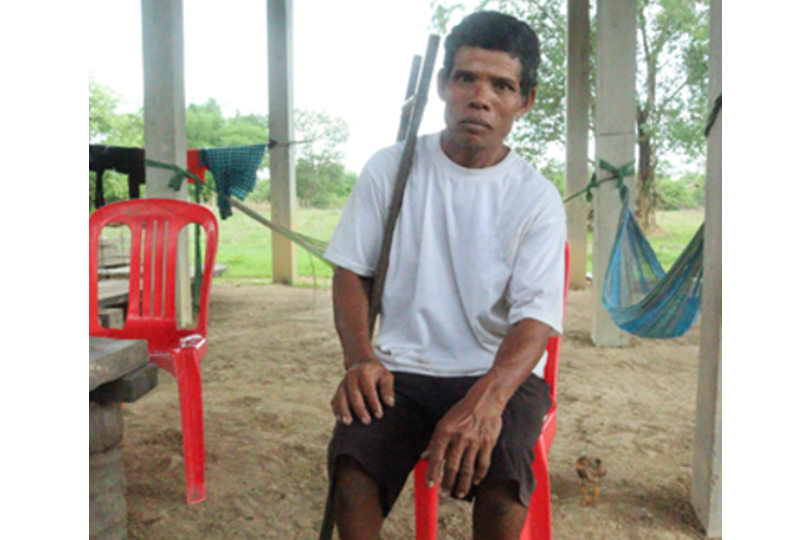
In the quiet village of Krom, nestled along the Mekong River in Stung Treng province, 46-year-old Mr. Son Bai lives with his wife and daughter in a modest household with no electricity or reliable water supply. A person with disability, his livelihood depends on farming, forestry, and fishing—activities that have grown increasingly difficult as local ecosystems deteriorate. Once residing on an island with abundant fish stocks, declining catches and weakened physical health forced Bai to relocate to the mainland, where fishing trips are longer and more strenuous.
Despite these challenges, Mr. Bai emerged as an active contributor to the IP2 project implemented by My Village Organization (MVi). His firsthand knowledge and experience became vital in shaping inclusive dialogue around cross-boundary river ecology and fisheries management.
During a community meeting focused on environmental changes, Mr. Bai shared insights on shifting fishing practices and ecological impacts in the Mekong. He later participated in a household interview, providing detailed accounts of declining fish stocks and the economic strain on his family. Recognizing the value of his voice, MVi invited him to a regional dissemination workshop—where he engaged directly with local authorities and other stakeholders.
This rare opportunity allowed Bai to express the lived reality of marginalized fishers with disabilities. His perspectives helped bridge the gap between community members and policymakers, calling attention to the pressing need for inclusive approaches to water governance and natural resource protection.
Through his involvement, Mr. Bai not only amplified the concerns of his community but also demonstrated how persons with disabilities can contribute meaningful insights to environmental decision-making. His story reminds us that inclusion isn’t just a principle—it’s a necessity for sustainable, equitable resource management.
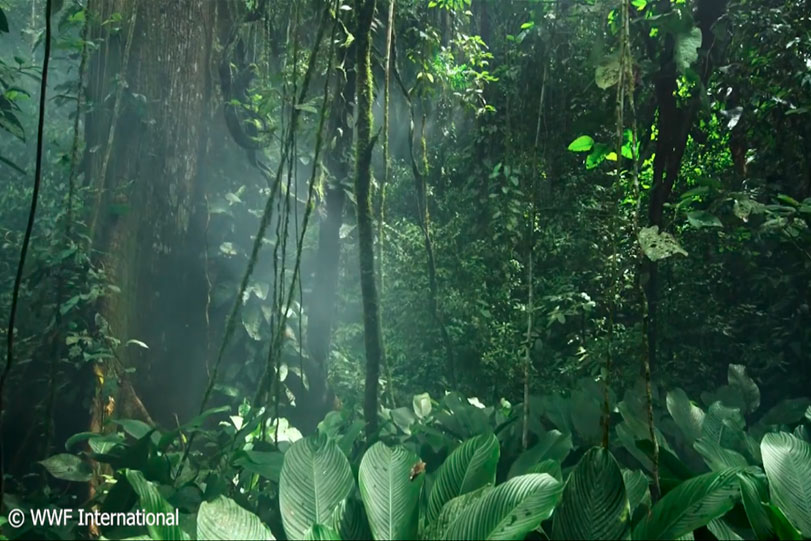
Wildlife plays an important role in protecting the environment, natural heritage and national ecotourism, which is an inexhaustible source of income for local communities and the national economy.
What should local communities do to prevent and reduce wildlife trafficking and consumption in Cambodia?
Participate in talking about the negative impacts of eating and trading bushmeat together to protect and conserve the environment, natural resources and encourage the local ecotourism sector to grow steadily to ensure the economic sustainability of local communities and our national economy.
#Talk2ProtectOurWildlife #SayNoBushmeat #NegativeImpactOfBushmeatOnHumanHealth #TogetherForCambodiaWildlife #TimeToStandUpForTheWildlife #TogetherWeSaveOurWildlife #WildlifeIsnotMadicine
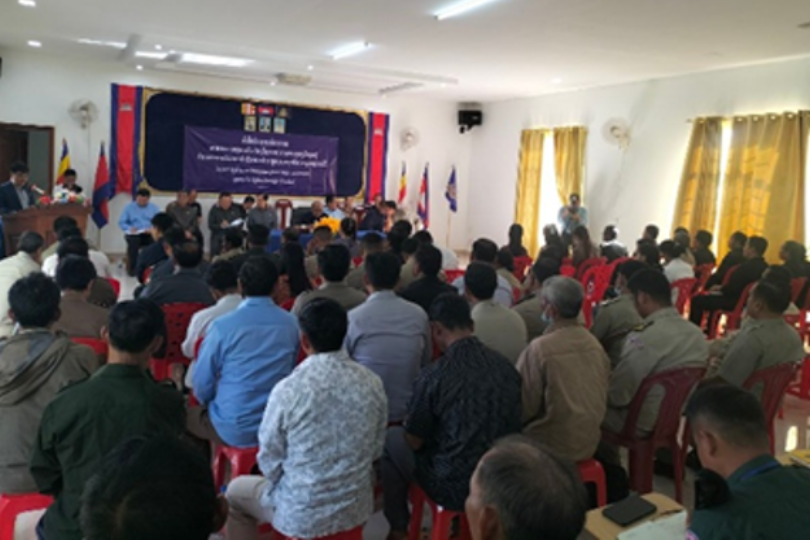
For years, the Punong Indigenous People of Pu Rang village—home to 64 families within the biodiverse Keo Seima Wildlife Sanctuary—have sought formal recognition of their ancestral lands.
Despite submitting applications for 21 parcels spanning 775.83 hectares, their Indigenous Collective Land Title (ICLT) was obstructed by unresolved land disputes with outsiders.
Tensions mounted as delays persisted, leading to discouragement and the threat of community disbandment. Yet in a pivotal moment on June 6, 2024, My Village Organization (MVi), alongside CLEC and CIPO, convened a high-level community meeting with a Ministry of Interior representative. This event reenergized the community’s determination to pursue land justice.
In 2023, MVi supported the Pu Rang community in petitioning the Senate to resolve a long-standing conflict over 255 hectares of contested land.
Their appeal urged intervention from both the Senate and provincial authorities, citing the barriers the dispute posed to securing their ICLT.
Initially met with hesitation due to internal challenges, the community stood firm, exemplifying resilience through organized advocacy.
The momentum continued. On September 19, 2024, the Ministry of Interior convened a multi-stakeholder meeting to gather facts and chart a resolution path. Encouraged to speak directly, Pu Rang representatives presented their grievances and supporting evidence. A follow-up meeting was held on January 31, 2025, signaling increased urgency and attention from national authorities.
Ultimately, Pu Rang’s unwavering efforts bore fruit: the 255-hectare dispute was resolved, clearing a major obstacle in their ICLT process. This victory not only secured their territorial rights but also affirmed the strength of collective voice, legal advocacy, and Indigenous-led mobilization.
The Pu Rang experience stands as a beacon of how perseverance and community solidarity can overcome systemic barriers and protect Indigenous heritage for generations to come.